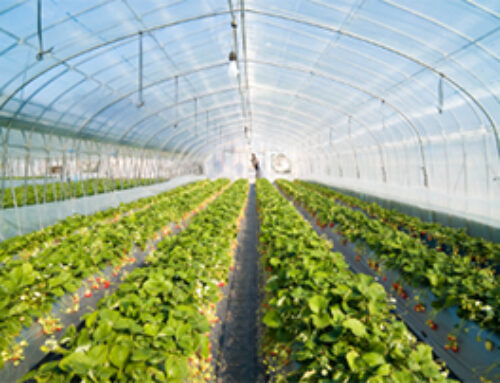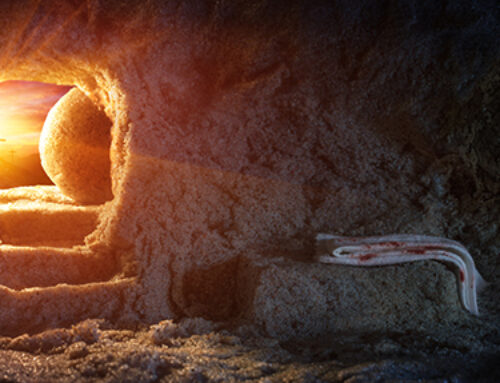

This scene got me thinking while we stayed in Lunenberg, Nova Scotia on a family holiday.
At our campground, I saw a big, beautiful slide-out motorhome with a Jeep parked beside it. The spare tire cover on the Jeep proclaimed, “Life is good.” It struck me, “Is having a large motorhome, a cool vehicle and lots of leisure time what makes life good?” What if we had none of these—would life still be good?
Would you please keep these questions in mind as you read about Jesus feeding the five thousand in John 6:1-15?
Everyone enjoys the Lord’s natural provision.
When we join the story in John 6:1 we find a great crowd of people enamoured with Jesus and fascinated by His works and His words. He is riding the wave of the public opinion polls. In fact, He could have launched a military revolt against the Roman Empire right then and there.
This great crowd was hanging on every word that Jesus spoke—so much so that they lost track of time (see Matthew 14:15). The Lord shows again that He has a limitless supply for His creation. Almost all the books from Genesis to Malachi were written originally in the Hebrew language. In these writings, several names are given to God. One name is Jehovah Jireh, which means “the Lord will provide.”
Understanding that the Lord provides everything we need is foundational for a relationship with Him. Without this foundation, our lives will be marked by distrust, fear and stinginess. With this foundation, our lives will be marked by trust, peace and generosity.
How can we trust Him for our eternal spiritual food if we cannot trust Him for our temporal physical food?
Do you lie awake at nights worrying about your bills and your future? The Lord wants to remind you that He is Jehovah Jireh, which means “the Lord will provide.”
Do you give only what you have leftover at the end of the month? The Lord wants to remind you that He is Jehovah Jireh, which means “the Lord will provide.”
Everyone enjoys the Lord’s natural provision, but only a few enjoy His spiritual provision.
The next day the crowd went looking for Jesus and found Him on the other side of the Sea of Galilee. Jesus could have revelled in all the attention and rode the wave of popularity. Instead, He goes on in John 6:53-71 to talk about eating His flesh and drinking His blood. As a result, some outside the faith would accuse the early Christians of cannibalism. From this time many of His disciples turned back and no longer followed Him. However, Jesus knew from the beginning who would stay with Him and who would not. He did not go running after them but explained that no one came to Him unless the Father enabled him.
Two cannibals were eating a clown and one turned to the other and asked, “Does this taste funny to you?”
I lamented to someone how few people really want to be active, growing disciples of Jesus Christ. They replied, “Is this really surprising? Jesus said this would be the case.” See Matthew 7:13-14.
Isn’t it interesting how fellowship with God is broken and bemoaned around food in Genesis chapter 3, then restored and celebrated around food in Revelation chapter 19? When we have Communion (The Lord’s Supper) together we are testifying to the Lord and to one another that we enjoy His spiritual provision. When you eat of the bread, you declare “I rely upon the broken body of Jesus Christ for my spiritual food.” When you drink of the cup, you declare “I rely upon the shed blood of Jesus Christ for my spiritual drink.”
Augustine (354–430 A.D.) was a brilliant thinker who came to Christ at the age of 33, then eventually became a bishop of what is modern-day Algeria. Saint Augustine confessed, “You have made us for Yourself, and our hearts are restless until they find their rest in You.” In reference to God, Augustine also observed: “My soul is too cramped for you to enter it.”
This profound observation is no less true of us some 1,600 years later!
We fill our lives with substitutes that do not truly nourish our souls. Substituting anything for what is God’s rightful place in our souls is idolatry.
Are you feeding upon Jesus? Do you live with an awareness of His presence wherever you go and whatever you do? Do you meditate upon His Word? Do you share your deepest desires, dreams and concerns with Him?
Leroy Eims writes in The Lost Art of Disciple Making
One spring our family was driving from Fort Lauderdale to Tampa, Florida. As far as the eye could see, orange trees were loaded with fruit. When we stopped for breakfast, I ordered orange juice with my eggs. “I’m sorry,” the waitress said. “I can’t bring you orange juice. Our machine is broken.”
At first, I was dumbfounded. We were surrounded by millions of oranges, and I knew they had oranges in the kitchen—orange slices garnished our plates. What was the problem? No juice? Hardly. We were surrounded by thousands of gallons of juice. The problem was they had become dependent on a machine to get it.
Christians are sometimes like that. They may be surrounded by Bibles in their homes, but if something should happen to the Sunday morning preaching service, they would have no nourishment for their souls. The problem is not a lack of spiritual food, but that many Christians haven’t grown enough to know how to get it for themselves (Source: Sermon Search—Leroy Eims).
Everyone enjoys the Lord’s natural provision, but only a few enjoy His spiritual provision. There is an eternal difference between being fed by Jesus Christ and feeding upon Jesus Christ.

Allan Pole
CESLM President
al@eslcooperative.ca





























































